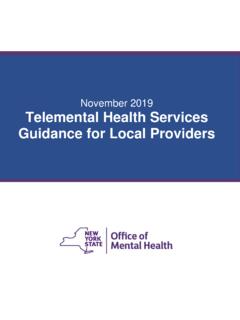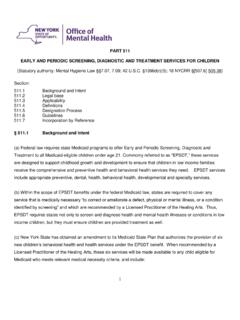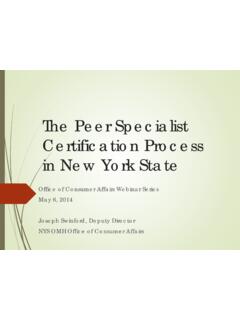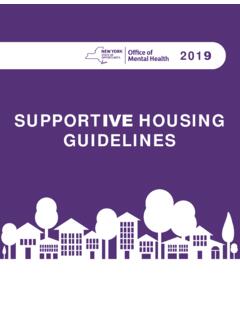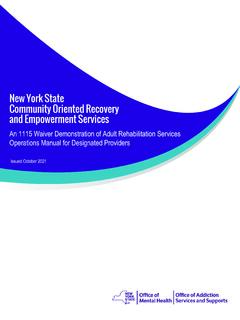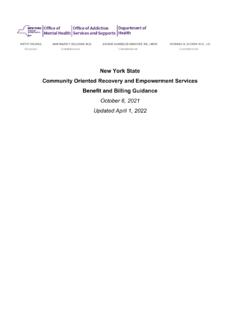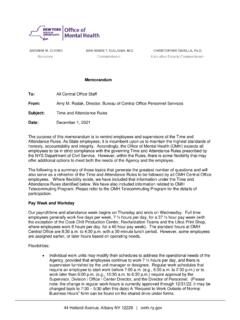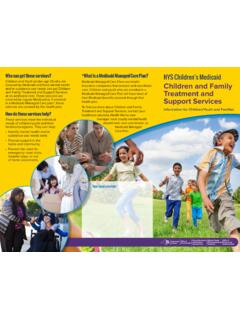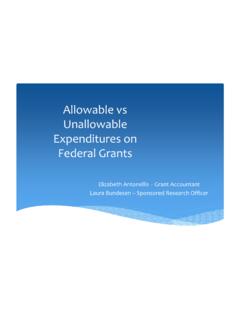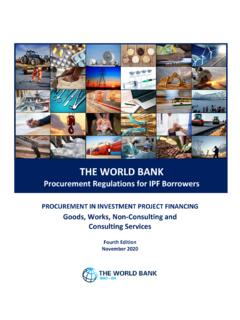Transcription of Request for Proposals Grant Procurements Intensive Crisis ...
1 Request for Proposals Grant Procurements Intensive Crisis Stabilization Centers (On-Line Submission Required) January 2022 Table of Contents and Background4 Purpose of the Request for proposal 4 Eligible Population 6 Bidder s Conference 6 2. proposal Submissions7 Designated Contact/Issuing Officer 7 Letter of Intent 7 Key Events/Timeline 7 Disposition of Proposals 7 Eligible Agencies 7 RFP Questions and Clarifications 8 Addenda to Request for Proposals 8 Disqualification Factors 8 Grants Gateway Requirement 9 Instructions for Bid Submission and Required Format 9 How to Submit a proposal 10 Helpful Links 10 Instructions for completing the Workplan and Objectives in NYS Grants Gateway11 3.
2 Administrative Information12 Reserved Rights 12 Debriefing 13 Protests Related to the Solicitation Process 13 Term of Contracts 13 Minority and Women Owned Business Enterprises 14 Participation Opportunities for New York State Certified Service Disabled Veteran Owned Business 15 Equal Opportunity Employment 16 Sexual Harassment Prevention Certification 17 Bid Response 17 Acceptance of Terms and Conditions 17 Freedom of Information Requirements 17 NYS and OMH/OASAS Policies 17 4. Evaluation Factors and Awards18 Evaluation Criteria 18 Method for Evaluating Proposals 18 Process for Awarding Contracts 19 Initial Awards and Allocations 19 Contract Termination and Reassignment 19 Award Notification 19 5.
3 Scope of Work19 Introduction 19 Objectives and Responsibilities 20 Implementation 22 capital project Funds 24 Reporting, Quality Improvement, and Utilization Review 24 Operating Funding 25 Narrative26 Equity 26 Population 28 Description of Program 29 Implementation 30 capital project Funds 32 Agency Performance 32 Reporting, Quality Improvement and Utilization Review 32 Financial Assessment 33 Page | 4 and Purpose of the Request for ProposalThe New York State (NYS) Office of Mental Health (OMH) and Office of Addiction Services and Supports (OASAS), hereinafter the Offices, announce the availability of operational funds and state-aid for the development of 12 new Intensive Crisis Stabilization Centers (I CSCs) within the 10 economic development regions.
4 The Offices are seeking to develop 3 Centers within the New York City economic development region and 9 Centers outside of New York City, one in each of the nine economic development regions listed below. I t is expected that the ICSCs will have executed contracts by October 2022 and be operational by January 2023. Development of ICSCs will be in accordance with Article 36 of the Mental Hygiene Law (MHL) and the to-be-promulgated regulations of Title 14 NYCRR Part 600, regarding certified Crisis Stabilization Center Programs. NYS MHL Article 36 authorizes Crisis Stabilization Centers to be jointly certified by the NYS Office of Mental Health and the Office of Addiction Services and Supports.
5 NYS Economic Development Regions Region Counties capital Region Albany, Columbia, Greene, Saratoga, Schenectady, Rensselaer, Warren, Washington Central New York Cayuga, Cortland, Madison, Onondaga, Oswego Finger Lakes Genesee, Livingston, Monroe, Ontario, Orleans, Seneca, Wayne, Wyoming, Yates Long Island Nassau, Suffolk Mid-Hudson Dutchess, Orange, Putnam, Rockland, Sullivan, Ulster, Westchester Mohawk Valley Fulton, Herkimer, Montgomery, Oneida, Otsego, Schoharie New York City Bronx, Kings, New York, Richmond, Queens North Country Clinton, Essex, Franklin, Hamilton, Jefferson, Lewis, St. Lawrence Southern Tier Broome, Chemung, Chenango, Delaware, Schuyler, Steuben, Tioga, Tompkins Western New York Allegany, Cattaraugus, Chautauqua, Erie, Niagara New York State is developing a comprehensive Crisis response system, available to all New Yorkers, regardless of location of residence or ability to pay.
6 This system will emphasize a person-centered continuum of care that enables individuals to enter and exit the system based on need. To this end, OMH and OASAS are committed to the development of increased, enhanced, and connected Crisis services across the state composed of a telephonic triage through the implementation of 988, the continued support and development of mobile Crisis teams, Crisis residential programs, Crisis stabilization centers, and other community services and supports. Page | 5 There are two types of Crisis Stabilization Centers (CSCs) being developed by OMH and OASAS: Supportive Crisis Stabilization Centers (SCSCs) and ICSCs (ICSCs). This RFP is specific to the development of ICSCs (ICSC).
7 Supportive Crisis Stabilization Centers means a center that providessupport and assistance to individuals with mental health and/or substanceuse Crisis symptoms. Services are for individuals experiencing challengesin daily life that do not pose a likelihood of serious harm. Such challengesmay create risk for an escalation of behavioral health symptoms thatcannot reasonably be managed in the person s home and/or communityenvironment without on-site supports. SCSCs will provide voluntaryservices with an emphasis on peer and recovery support. SCSCs will alsoprovide, or contract to provide, behavioral health stabilization servicestwenty-four hours per day, seven days per week. Recipients may receiveservices in a SCSC for up to twenty-four hours.
8 Intensive Crisis Stabilization Centers means a centerthat provides urgent treatment to individuals experiencing an acutemental health and/or substance use Crisis . ICSCs offer all servicesprovided at a SCSC in addition to providing rapid accessto services for acute symptoms to assist in diversion from a higher level ofcare, including medication treatment for management of substance useand mental health symptoms. ICSCs will provide voluntary crisistreatment services, with an emphasis on peer and recovery support, in asafe and therapeutic environment. ICSCs will also provide, or contract toprovide, behavioral health stabilization and referral services twenty-fourhours per day, seven days per week.
9 Recipients may receive services inan ICSC for up to twenty-four offer walk-in services to all individuals, including adults, children, adolescents, and families, 24/7, 365 days per year. All services are voluntary, person-centered, and trauma-informed, with an emphasis on peer and recovery-oriented support. Centers must ensure services are delivered in a comfortable and welcoming environment by staff from various disciplines, including but not limited to, Peer Specialists and Advocates, Credentialed Alcoholism and Substance Abuse Counselors (CASACs), Licensed Mental Health Professionals, Registered Nurses, Psychiatric Nurse Practitioners, and Psychiatrists. ICSC staff will be culturally competent, understanding and respecting everyone's personal preferences throughout their interactions.
10 ICSCs should form partnerships with other agencies within the Crisis response system, including but not limited to mobile Crisis providers, Crisis residences, Supportive Crisis Stabilization Centers, law enforcement, EMS, and other community treatment and support services. The development and implementation of CSCs reflect the commitment of the Offices to enhance the development of a comprehensive Crisis response system in NYS. The Offices anticipate Title 14 NYCRR Part 600 will be re-posted for public comment by February 2022. The reposted Crisis Stabilization Program Regulation will be available at the links below. Draft Crisis Stabilization Program Guidance will be released at a later date and will be available using the links below: Page | 6 Title 14 NYCRR Part 600: Laws and Regulations | Office of Addiction Services and Supports ( ) Crisis Stabilization Program Guidance: Laws and Regulations | Office of Addiction Services and Supports ( ) Eligible Population ICSCs are designed to serve all New Yorkers experiencing a mental health and/or substance use Crisis in their service area regardless of age, ability to pay, or location of residence.
